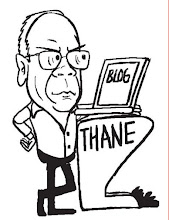I would not be surprised if that is the first agenda of the proposed Yuva Sena. But I do hope it would not be for in India, the list of books either restricted because of mob fury or proscribed because of the government's lack of intellectual strength, is only growing. If books get banned, then what happens to the researchers of the future? Where would they look for them for references?
When the Supreme Court of India recently ruled that James Laine's work on Shivaji, The Hindu king in Mughal India (Oxford University Press) was to be allowed to be stocked and sold, it did not translate into their reappearance on the book stores. I tried in Hyderabad. I looked for it in Bangalore but no, the book stores said, they had been advised that the publishers may send it to them but it has not happened. It is not banned now, but it is now available.
This issue of the value of a banned book did crop up at The Asiatic Society of Mumbai recently but a resolution that the society "institute a reference section of banned books where the same will be available to researchers for reference" did not pass muster. It was sensible thing to do but then Society is trammelled by the fact that it secures state funding. And a banned book, if retained, is illegal. The Managing Committee's comment in the agenda papers was, 'Stocking of 'banned' books is illegal and the Society may land in trouble if such books are purchased, lent for reading or kept for browsing, even for research purposes".
That is sad. If I know its head, Dr Aroon Tikekar, a scholar, researcher, and writer is a person who does not like proscribing books for it is an assault on freedom to think. But apparently the legal compulsions seem to be superseding any intent to ensure the availability of such books. I wonder if it were possible to scan and upload such books on the Internet so that access becomes possible? Individuals with the means to do so ought to be coming forward. I appeal to such persons to step forward.
Just for those why may have missed it, here is a report from the Times of India which my friend Ambarish Mishra wrote just prior to the debate at the Asiatic:
Mumbai: A two-line resolution demanding that the library of the Asiatic Society of Mumbai should stock books that have been banned by the government over the years has triggered a fresh debate on censorship and the states role in it.
The resolution will come up for discussion at the Societys general body meeting on Saturday.
The Society was flagged off in 1804 and is a treasure-trove of rare books,manuscripts and coins.Activist and Malayalam writer K Haridas,a senior member of the Society,who moved the resolution,said, "Those in power ban books right,left and centre and,that too,on extraneous grounds.Owing to that,researchers and scholars are often deprived of rich study material. So,these prohibited books should be stocked in library but the Society should frame stringent rules to avoid their wrongful use". The resolution has been seconded by another member and scholar,M V Kumar.
However,in its comment on the resolution,the Societys managing committee warned that stocking banned books might mean flouting of statutory rules.Keeping prohibited books in the library is patently illegal, said society president Aroon Tikekar.Elaborating on the point,he added,The Society cannot violate the law of the land.Moreover,what if a researcher who is given access to a banned book misuses or distorts information. Should this happen,the Society will have to bear the brunt as it happened in the James Laine case.The hooligans went on the rampage at Punes Bhandarkar research institute.
Haridas has suggested a way out.The Society should write to the Central as well as the Maharashtra government,seeking exemption for the books that have been banned.Given the Societys fame as one of the most illustrious institutions of learning and scholarship of the country,I am sure the government will take a generous view of it, Haridas said.
Many members will also share scholar and cineaste Veerchand Dharamseys concern.The problem is that the Asiatic Society has no proper rules.Who is to decide the credentials of a scholar Tomorrow,anyone may walk in and ask for the copy of a prohibited book as there are no sharp guidelines on this issue, said Dharamsey.
Marathi literateur Ashok Shahane,another senior member,said it should go ahead and adopt the resolution without worrying about possible cases of vandalism.Vandalism is the home departments worry.Put the ball in the court of the police.They should tackle the hooligans, he added.
Pointing out that the British Museum stocks banned books,Shahane said the Asiatic Society has survived many regimes,including the British Raj.Knowledge outlives politics.We should not allow politicians to encroach on the republic of knowledge.Dr Tikekar,too,agreed that banning books is ethically wrong.Knowledge has no barriers and it is timeless."

No comments:
Post a Comment